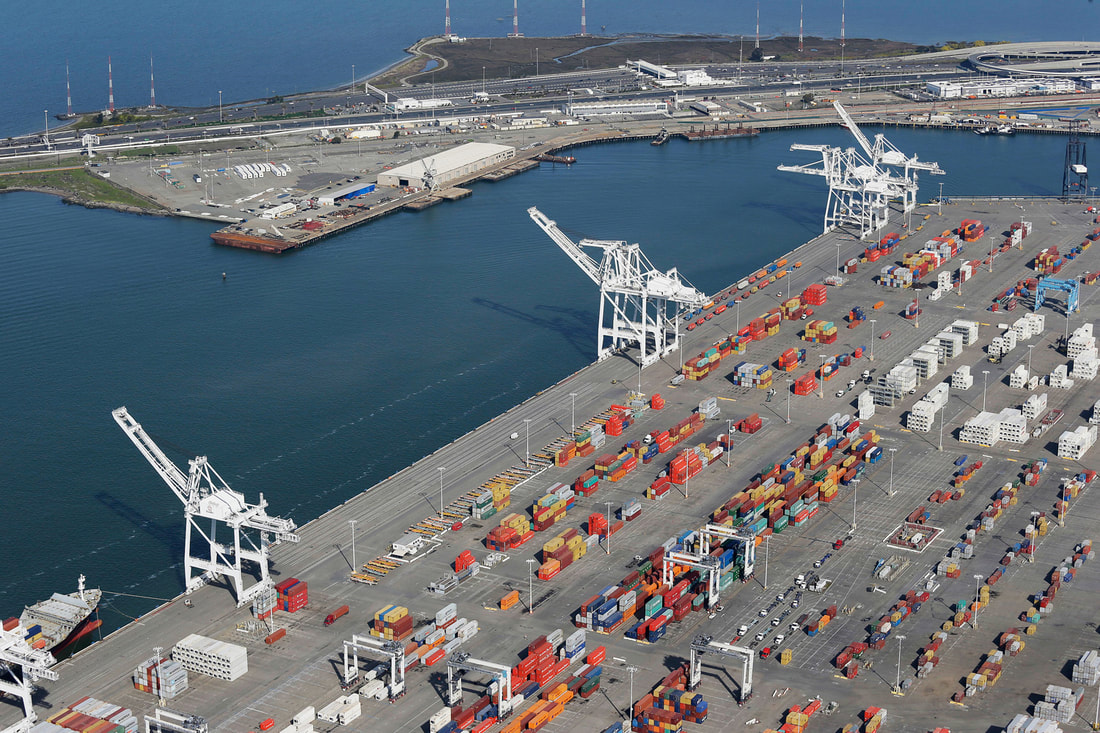|
Oakland cancels Bay Area port project that would ship Utah coal sltrib.com/news/environment/2018/11/14/oakland-cancels-bay-area  (AP Photo/Eric Risberg, File) This Feb. 5, 2016, photo shows the former Oakland Army Base pier at left and the Port of Oakland at lower right in Oakland, Calif. A federal judge in California on Tuesday, May 15, 2018, struck down the city of Oakland's ban on coal shipments at a proposed cargo terminal, siding with a developer who wants to use the site to transport Utah coal to Asia.  By Brian Maffly City leaders in Oakland, Calif., have formally yanked the plug on a marine port project that Utah’s coal country hoped would connect its mining output with Asian markets. In a correspondence exchange last month, the city notified project developer Phil Tagami it was terminating his firm’s lease for failure to meet construction milestones specified in the contract. Tagami responded with a 51-page notice of claim threatening to sue the city for allegedly sabotaging the project. The proposed Oakland Bulk and Oversized Terminal, or OBOT, was to be the linchpin of a major redevelopment project for the decommissioned Oakland Army Base on the San Francisco Bay. It became mired in controversy three years ago, when Oakland officials got wind of the developer’s deal with coal-producing Utah counties. Carbon, Emery, Sevier and Sanpete counties sought to borrow $53 million from the Utah Community Impact Board (CIB) to invest in the $250 million terminal in exchange for at least half the terminal’s 10-million-ton “throughput capacity.” The deal outraged many Oakland residents, who believed the politically connected developer deliberately concealed coal’s central role in the state-of-the-art, rail-to-ship terminal and misleadingly billed it as a standard setter in environmental stewardship. Heat-trapping carbon emissions from burning coal for electricity are considered a leading contributor of climate change. And East Bay residents were unhappy with the prospect of hundreds of coal-filled rail cars rattling through their densely populated cities. But Oakland’s move to cancel its agreements with Tagami had little to do with coal, according to City Attorney Barbara Parker. “This is about the developer’s failure to meet its obligations and perform the work it agreed to do. OBOT had years to move this project forward, and has used every excuse in the book to justify its failure to perform,” she said in a written statement. “This terminal is a critical project that will be an economic engine for West Oakland, our entire city and the region. The city must move this project forward with partners who are able to get the job done.” The city’s action effectively quashes the rural Utah counties’ hopes of exporting coal through Oakland. Carbon County Commissioner Jae Potter, an early proponent of the counties’ involvement in the project, did not immediately return a phone message. Citing concerns about coal dust coming off rail cars and transloading equipment, the Oakland City Council enacted a ban on coal-handling in 2016. That prohibition prompted a lawsuit from Tagami, who prevailed earlier this year when a federal judge overturned the ban in a decision the city is now appealing. That suit was funded by Bowie Resource Partners, Utah’s leading coal producer and a partner in the terminal project. Since then, Bowie changed its name to Wolverine Fuels, moved its headquarters to Sandy and shuffled its executive leadership. Former Bowie executive John Siegel is now chairman of a new firm called Insight Terminal Solutions, which recently took over contract to operate the export terminal.
0 Comments
Leave a Reply. |
Gene HazzardDon't Be Envious of Evil Men Archives
June 2024
Categories
All
|
- Home
- Sanjiv Handa
- Gene's Blog
- Rotunda RFP
- Gene Hazzard -Keeping eyes open
- Chronology of Tagami's scheme of Private-Public Partnership with City Projects
- Another Tagami scheme - Rotunda Building deal
- Oakland Army Base
- Billboards in Oakland
- Port of Oakland
- Oakland Raiders?
-
Who is running Oakland?
- Jerry Brown
- Don Perata
- Judge Robert B. Freedman
- Jacques Barzaghi
- Gawfco Enterprises
- Deception
- Doug Bloch
-
Phil Tagami
>
- SF Business Times November 20, 2005
- Rotunda wrestling
- A conversation with Oakland developer Phil Tagami
- Audit of $91 million Fox Theater project
- Tagami Conflict
- CCIG Response to Oakland Works
- Oakland developer Phil Tagami named to state medical board
- ‘Shotgun Phil’ hits another bullseye — with governor’s help
- CleanOakland Store
- CenterPoint Properties


 RSS Feed
RSS Feed
